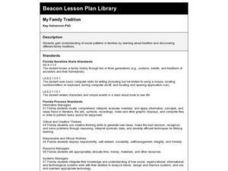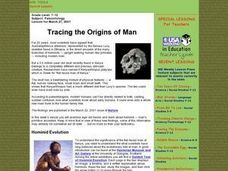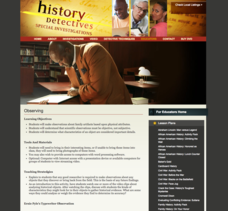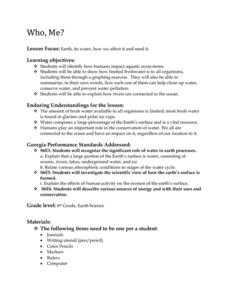Curated OER
My Family Tradition
Students examine different family traditions to further explain social patterns. They complete a graphic organizer using educational software.
Curated OER
The Value of Genetic History
Students research and assemble their own pedigrees using star patterns for each family member and coloring in various dominant traits. They arrange these patterns on long strips of paper making large, colorful family pedigrees.
Curated OER
Family Pedigrees
Students work as a class to first construct a pedigree of a popular singer, showcasing the singing gene being passed down through the generations. Students then make their own family pedigree and follow two traits through their family...
PBS
Stories of Painkiller Addiction: Contemplating Nature vs. Nurture
Does having an addict in your family make it more likely to become one yourself? Explore the genetic risk factors, as well as the prominent environmental influences, for substance addiction in a instructional activity that encourages...
Curated OER
A Discourse on the History of Language
Analyze and make inferences from the information used by linguists to construct the evolution of languages. They research different dating techniques to explain how scientists infer age with evidence.
International Technology Education Association
Reinventing Time
Take a trip through time. A lesson resource provides instruction on the origin of current measurements for time. The text explains the different tools humans used throughout history to measure time as well as provides examples such as...
AAAS
Identification and Classification of Grassland Plants
Take learning outside and start classifying grasslands. Young ecologists observe grassland plants in order to classify them into the appropriate species by family. They note their characteristics and where they grow. A true field...
Curated OER
Ancient Camel History "Cloze" Page
In this ancient camel history worksheet, students complete a cloze activity in which 7 words from a word bank are inserted into a factual text. This is to be used with an information handout that is not included here.
Curated OER
The Value of Genetic History
Students explore their genetic background. They assemble their own pedigrees using star patterns for each family member and identifying various dominant traits. Predictions are made for future offspring.
National Park Service
Leave it to Beavers
Many people know cats mark their territories by rubbing the back of their necks to leave a scent, but not many people know beavers also leave a scent to mark their territories. During the first activity of two, scholars use their noses...
Curated OER
Changing Planet: Infectious Diseases Classroom Activity
Here is a different approach: emerging epidemiologists first go home to interview family on the topic of infectious disease. Then they come to class and view a video and PowerPoint that explore how climate change may increase the...
Population Connection
Where Do We Grow from Here?
Did you know that the population is expected to grow to 11 billion by 2100? The resource serves final installment in a six-part series on the global population and its effects. Scholars interpret data from the United Nations about the...
American Museum of Natural History
Create a Coral Reef
Scholars create a diorama to showcase a vibrant coral reef. Six steps walk pupils through setting up the diorama box, crafting four different types of marine life, and putting it all together.
Curated OER
What Is Happening in Haiti?
Students discuss the 2010 earthquake in Haiti and empathize with the victims of the disaster. In this 2010 Haitian earthquake instructional activity, students learn about the history and hardship the country has consistently faced. They...
Curated OER
Tracing the Origins of Man
Young scholars discuss Hominid evolution through various websites and other resources. They examine online fossil skulls, discuss the use of tools by ancient man, and look for examples of sophisticated tools built by man.
American Museum of Natural History
A Closer Look at Mars
A website looks at how we know so much about Mars—telescopes, robots, and spacecraft—and the search for martian life. Following the informational text are three questions that quiz pupils about possible life on Mars.
Curated OER
Conceptualizing an Experiment
Young scholars work together to design an experiment. They discover the origin of a family artifact. They analyze the data and discuss the results. They determine if the experiment is the best way to find out this type of information.
Curated OER
The Use of Myths in Science
Young scholars are told stories, myths and legend to explain their world. After telling the tales and discussion them, students are assigned to write a myth that describes a familiar situation, such as why the school garbage cans are...
PBS
Observation
Learners study making scientific observations . They conduct a "field study" in their attic and make observations about their family artifacts based upon physical attributes. In addition, they determine what characteristics of an object...
Curated OER
Eyes in the Sky
Middle schoolers examine the use of satellites. For this research lesson, students discuss the history of satellites and how we use the information today. They will conduct interviews with older adults who have lived in the changing...
American Museum of Natural History
Journey to the Stars
Fifteen detailed pictures and informative captions delve deep into the exploration of stars—their life cycle and importance in the universe.
Curated OER
Predicting: Making a Hypothesis
Students analyze information from various sources to create a hypothesis about the origin of a family artifact. Students create a hypothesis about the origin of the item and write a paragraph explaining why they believe the hypothesis is...
Curated OER
Testing the Hypothesis
Middle schoolers create and conduct various experiments to determine the origin of a family artifact, and then determine whether their results were successful. Students summarize their results and evaluate whether their hypotheses were...
Curated OER
Who Me?
Students examine their place in society by looking closely at themselves as well as their role in their family and community. Students also examine the origin of the National Parks system and how it contributes to National Identity.

























